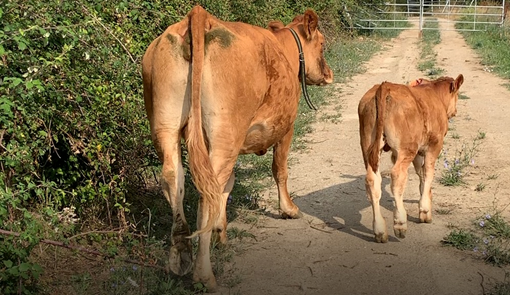
This pilot innovation consists in the development of collars with GPS tracking sensors to restrict livestock movements without the use of physical barriers to be used in remote mountain areas. When the animal is approaching a virtual boundary, an acoustic signal sounds, increasing in intensity until a vibration or a small electric discharge is perceived. In this way, the animal learns the initial signals that limit their movement forward. The system also allows cattle movements to be guided by mobile phone or tablet.
This technology has the potential to improve livestock and pasture management and to reduce labour and costs associated with physical fences. Furthermore, it can also detect individual inactivity, which may be related to a health issue. Therefore, the positive impacts in three of the four themes of the BovINE project are expected: 1) Socioeconomic Resilience; 2) Animal Health & Welfare; and 3) Production Efficiency & Meat Quality.
The collars are being tested on cow-calf and beef finishers’ farms, but also on small ruminants and horses from the Pyrenee and Pre-Pyrenee regions in Aragón, Spain.

Source: Facebook Esnepi - Escuela de Negocios del Pirineo
Challenges such as ensuring a sharp learning of the animals to be easily managed and to avoid them ‘jumping’ the fence are being addressed, between other technical features. The electric discharge (lower voltage than that produced by electric fences), by causing a negative stimulus, is effective but raises animal welfare concerns, especially in view of a potential fault of the devices. The price of the collar is initially expensive, but a commercial company will be able to optimise production costs if the pilot study yields satisfactory results.
This innovation corresponds to an ongoing research project named e-barana, which was founded by the FEDER Programme (GG02017C00500). The project is being led by Reserva de la Biosfera Ordesa-Viñamala, involving a commercial company (HEMAV) and several farmers’ associations and other partners (detailed in https://www.esnepi.es/e-barana/); it will be finalised at the end of this year.
An in vivo Webinar was organized by Unizar on the 28th of June 2021 to show and discuss experiences on Virtual Fencing being carrying out on Spanish and British beef farms. Alfonso Abecia (Unizar, Spain) and Russ Carrington (Knepp Regenerative Farms, UK) explained how the technology works and shared their experience. The webinar can be watched in the video below:
Literary Sources:
More information can be supplied by Alfonso Abecia (Unizar): alf@unizar.es